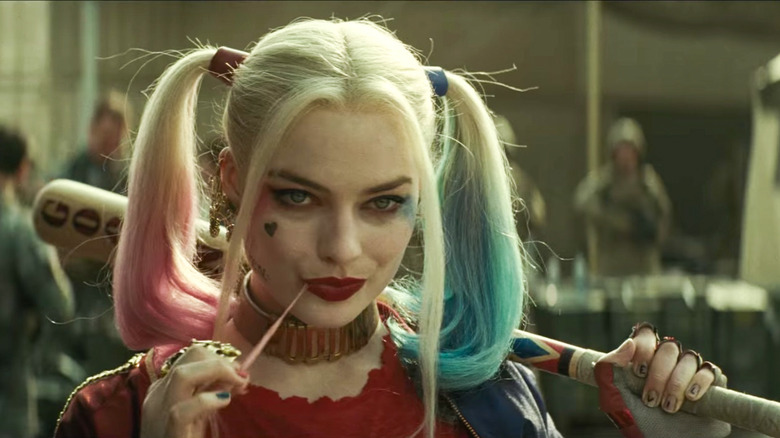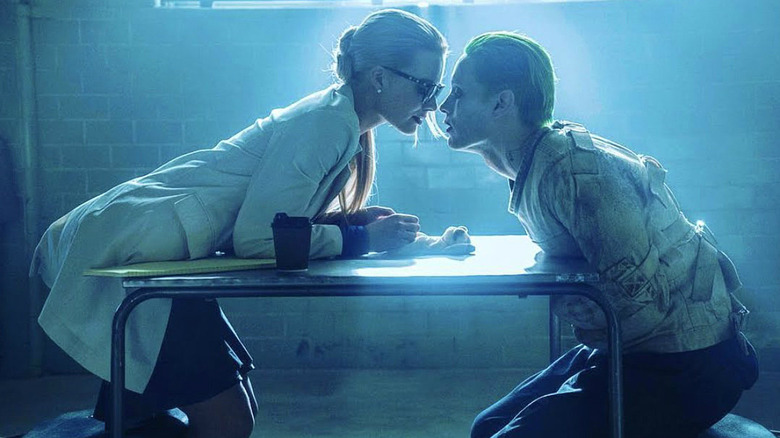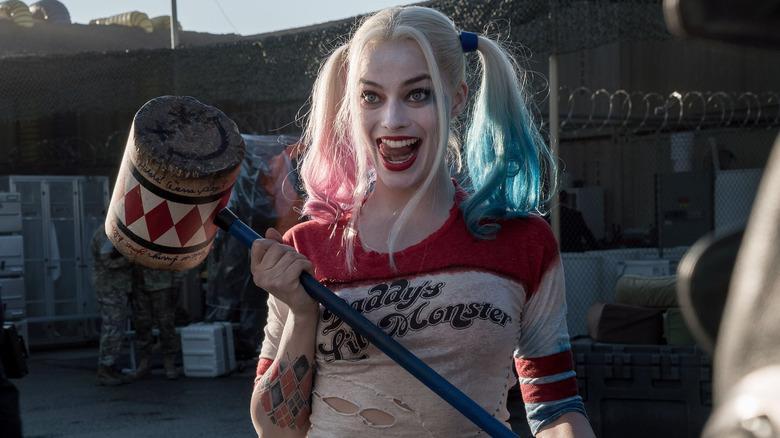A Key Part Of Harley Quinn's Character Frustrated Margot Robbie
The character of Harley Quinn — a harlequin-clad moll for the Joker — first appeared on "Batman: The Animated Series" in the 1992 episode "Joker's Favor." She was played by voice actress Arleen Sorkin, who gave the character a Brooklyn-adjacent "bubblehead" voice that immediately struck viewers and quickly earned the character fans. Harley Quinn was very similar in look and presentation to a character named Prank (Zoey Clark), the kooky moll of the Trickster on the 1990 series "The Flash." Her origin story was simple: Dr. Harleen Quinzel served as the Joker's psychiatrist, and he had such a powerful personality, that she abandoned ordinary life to become his supervillainess girlfriend.
Harley would appear in only nine episodes of "Batman: TAS," but she eventually began appearing in DC Comics. In recent years, Harley has become arguably a more popular character than the Joker and has formed a life of her own, breaking up with the Joker and becoming a daffy murderer with a great deal of agency. She is currently fostering a romantic relationship with the villainess Poison Ivy.
Harley Quinn first appeared in live-action in the 2016 film "Suicide Squad." Margot Robbie played Harley similarly to Sorkin, but was a more "adult" version, outfitted in chrome, psychotic stripper wear. In "Suicide Squad," Harley was in prison, separated from her beloved Joker (Jared Leto). She spent portions of the movie attempting to orchestrate their reunion.
While Robbie captured a lot of Sorkin's clownish excitement and came to like Harley as a character, the actress admitted to the Washington Post in 2016 that she didn't quite understand why Harley might be drawn to an abusive boyfriend like the Joker. It wouldn't be until Robbie started reading up on co-dependent relationships that she would understand.
Why him?
To research the role, Margot Robbie purchased a pile of DC Comics starring Harley Quinn, hoping to get a good taste of the character's literary origins. The actress didn't intend to read them all, but she ended up making a deep dive into Harley, hoping to find the answer to a question that vexed her. Namely: what did Harley Quinn see in the Joker? He was, after all, a madman and a murderer. The version of the Joker in "Suicide Squad" was especially unbalanced, coming across as a new-money, club-dwelling brat, a change of pace from the murderous anarchist with a circus fetish audiences were used to. Why would a trained psychiatrist abandon everything and become a violent clown ... just for a man? Robbie said:
"I just didn't understand how she could be such a badass and then fall to pieces over some guy. I found that really frustrating. [...] Fans seem to really love that about her, that she has this complete devotion to a guy that treats her badly."
It was Robbie's acting coach, Jean-Louis Rodrigue, who suggested she began looking into codependency that things came together. Rodrigue recommended Robbie read Sam Shepard's 1983 play "Fool for Love" to get some insight. "Fool for Love" takes place in a motel room in the Mojave Desert wherein a character named May has been hiding out from an abusive boyfriend named Eddie. Eddie tracks her down and tries to convince her to return to him. They hate each other, but also seem weirdly linked. It will later be revealed that Eddie and May are, unbeknownst to them, half-siblings.
Pain, abuse, codependency. It all began to fall into place for Robbie. Harley was a tragic figure.
Once the handle is found...
Margot Robbie also admitted to reading up on co-dependence in general, presumably finding case studies and delving into the psychology of the phenomenon. Harley Quinn was a badass, but even badasses can be abuse victims prone to manipulation. Robbie continued:
"Once I could view it in those terms, it suddenly made sense, and I suddenly had so much empathy for Harley and after that it was all very straightforward. [...] It was fun after all that."
The follow-up film to "Suicide Squad" was called "Birds of Prey (and the Fantabulous Emancipation of One Harley Quinn)," directed by Cathy Yan. That film solved a lot of the problems Robbie encountered in "Suicide Squad" by making it explicitly about her breakup with the Joker and the forging of her own identity as a less-than-villainous character. Harley's outfits became decidedly less strip-club-ready, and she accumulated a new cadre of female friends who supported her outside of her association with Mr. J.
Harley would also appear in James Gunn's "The Suicide Squad," only now she was back to being a lovelorn romantic. However, when her potential paramour betrays her, she's quick to murder him. Sadly, neither "Birds of Prey" nor "The Suicide Squad" were huge hits, so it's unlikely Robbie will play the character again. Harley Quinn will next appear, played by Lady Gaga in Todd Phillips' "Joker: Folie à Deux." That film will detail Harley's origin opposite a Joker played by Joaquin Phoenix.


